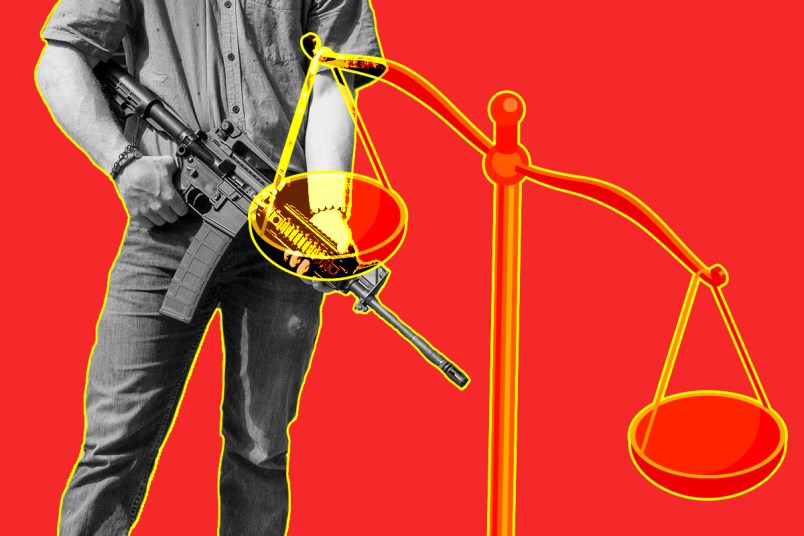This article is part of TPM Cafe, TPM’s home for opinion and news analysis.
It’s been more than a decade since the Supreme Court decided a major Second Amendment case. But that dry spell ended with Monday’s decision to hear New York Rifle & Pistol Association v. Corlett. The specific question in Corlett is whether New York State’s requirement that individuals show “proper cause” to obtain a license to publicly carry a concealed handgun for self-defense violates the right to keep and bear arms. But in the course of answering that question, the Court could end up cutting down broad swaths of firearm regulation.
The fundamental issue before the Court in Corlett is whether and how the right to keep and bear arms extends outside the home. In its landmark decisions in District of Columbia v. Heller (2008) and McDonald v. City of Chicago (2010), the Court held that the Second Amendment guarantees a right to have a handgun in the home, emphasizing the home as the place where the interest in armed self-defense is “most acute.” In the wake of Heller, the overwhelming majority of courts have held or assumed that the right extends in some form beyond the front door, but most have also recognized—consistent with Heller’s focus on the home—that the government has greater authority to regulate gun use in public places. If the Supreme Court alters that balance, it could call many more gun laws into question.
A decision striking down New York’s law could affect millions of people across the country. Although only nine states have “proper cause” or “may issue” licensing rules (their details vary), nearly a hundred million people live in those states. In one stroke, the Court could hold that any person of legal age who is not otherwise prohibited from owning firearms (such as being a felon or adjudicated mentally ill) must be issued a license to carry weapons. The change could be especially consequential in highly urbanized areas of New York, New Jersey, Massachusetts, Connecticut, Maryland and California, where gun violence is endemic.
There’s also another, broader issue in Corlett – how are judges to decide whether a gun regulation violates the Second Amendment? Lower courts have, by and large, adopted a conventional approach over the last ten years that enables governments to justify their regulations with empirical evidence from crime and accident data, law enforcement testimony, public health professionals and other public policy sources. Second Amendment suits look very similar to other kinds of constitutional litigation in that way.
But some judges and justices (among them the Trump-appointed Justice Brett Kavanaugh) have apparently rejected this conventional approach in favor of judging the constitutionality of modern regulations solely by reference to their similarity to historical regulations — the “text, history, and tradition-only” approach. Depending on how rigidly a five-justice majority (assuming that will be the case) applies this text, history, and tradition-only approach, it could imperil a wide range of existing regulations that have no clear historical analogues.
Can a prohibition on loaded firearms in the cabins of commercial aircraft really be evaluated by reference to eighteenth-century analogues, instead of the demonstrable dangers of guns in planes? There is a robust and often-overlooked history of gun regulation in the United States (the New York law itself is over a century old).
But rigid application of a purely historical approach would almost certainly call into question a vast range of modern firearm regulations, from prohibitions on guns in hospitals and daycare centers to criminal sanctions for selling firearms to felons and the mentally ill. It would require judges to employ strained historical analogies rather than familiar legal tools, and would accord the Second Amendment a kind of supremacy that no other right in the Constitution can claim.
Whether the Court endorses this historical approach or not, the fact that the Court may soon strike down a regulation on the public carry of weapons will have deep political significance. Some states have recently loosened their rules on public carry; some have even eliminated permit requirements entirely. At the same time, some open carry activists have engaged in a concerted effort to normalize the presence of carrying weapons in public—to make a man walking towards a shopping mall with an assault rifle no more alarming than if he were carrying a carton of milk. That effort has coincided with a growing phenomenon of heavily armed groups showing up at political protests and inside state capitols.
Those pushing for these changes in law and norms often invoke the Second Amendment, but such political rhetoric should not be mistaken for a legal claim. Nothing in present constitutional law requires such broad deregulation. With Corlett, though, the Supreme Court could upend all that.
Joseph Blocher is the Lanty L. Smith ’67 Professor of Law at Duke Law School. Darrell A.H. Miller is the Melvin G. Shimm Professor of Law at Duke Law School. They are the faculty co-directors of the Center for Firearms Law at Duke.







Wow, I’m totally unsure as to how this might turn out.
/s
Glockz4All.
– Some goddamn communist
All that aside, the case they took up if an example of the Left getting a bit too greedy, denying licenses to some rather sympathetic plaintiffs who would have no problem getting a concealed carry permit in many other States.
If the Left insists on passing stupid laws and restrictions and opens up the opportunity, like they did here, for the Supremes to weigh in on it with a decision that has much broader impact, that’s really on them.
Ah, the old race to the bottom.